Stay Healthy During the Hot Season

Know About Drugs with Chula Pharmacists: Stay Healthy During the Hot Season
April is approaching, bringing the intense summer heat. Seasonal changes can introduce new health risks or exacerbate existing conditions, making it essential to prepare for summer-related illnesses.
Common Summer Health Issues
Hot weather and high humidity contribute to several health problems. Here’s what to watch out for:
1. Skin Problems: Sunburn
Thailand's strong sun can be harsh on the skin. Sunburn occurs when the skin is exposed to UV rays for too long without protection. Symptoms include redness, heat, pain, and peeling after 2-3 days. Severe cases may involve blisters and headaches.
Prevention & Relief:
2. Heatstroke & Dehydration
Heatstroke occurs when the body overheats and loses its ability to regulate temperature. Symptoms include flushed skin, dizziness, a rapid heartbeat, and fainting.
Prevention:
3. Food Poisoning & Digestive Issues
Hot weather accelerates food spoilage, increasing the risk of food poisoning. Symptoms include diarrhea, nausea, vomiting, and stomach pain.
Prevention:
1. Heart Disease & High Blood Pressure
Hot weather forces the heart to work harder to regulate body temperature, potentially leading to blood pressure fluctuations and increased risk of heart attacks or heatstroke.
Tips:
2. Diabetes
Heat can cause blood sugar fluctuations due to increased sweating and urination, leading to dehydration.
Tips:
3. Respiratory Diseases (Asthma, Emphysema)
Hot temperatures and pollution make breathing more difficult. Thick mucus can obstruct airways, increasing the risk of flare-ups.
Tips:
4. Chronic Kidney Disease
Excessive sweating can strain the kidneys, increasing the risk of dehydration and acute kidney failure.
Tips:
5. Neurological Conditions (Alzheimer’s, Parkinson’s, Epilepsy)
People with neurological disorders may have difficulty sensing thirst or heat, making them vulnerable to dehydration and heatstroke.
Tips for Caregivers:
Final Thoughts
Hot weather poses various health risks, especially for those with chronic conditions like heart disease, diabetes, kidney disease, and respiratory issues. Staying hydrated, avoiding extreme heat, and monitoring symptoms can help prevent complications. If you have any concerns, consult a pharmacist or reach out to the Guruya Drug Information Center, Faculty of Pharmacy, Chulalongkorn University, via Line @guruya.
Assoc. Prof. Dr. Nattada Areepiam and Assoc. Prof. Dr. Bodin Tiwasuwan
Faculty of Pharmacy Chulalongkorn University
เราใช้คุกกี้เพื่อพัฒนาประสบการณ์การใช้งานเว็บไซต์ของคุณให้ดียิ่งขึ้น คุณสามารถจัดการความเป็นส่วนตัวของคุณได้เองโดยคลิกที่ ตั้งค่า
